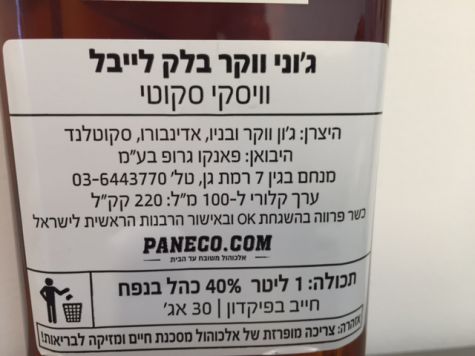1. a kashrut alert regarding a forged hechsher - actually unauthorized use of the Rabbanut hechsher.
 Whiskey in general is a complicated issue regarding kashrus. For some reason, whiskey never really was under the authority and supervision of the kashrut agencies. People knew which ones were kosher and which whiskeys were not, and kashrut agencies would release alerts and warnings, but whiskeys, until recently never bore the symbols of kashrus agencies..
Whiskey in general is a complicated issue regarding kashrus. For some reason, whiskey never really was under the authority and supervision of the kashrut agencies. People knew which ones were kosher and which whiskeys were not, and kashrut agencies would release alerts and warnings, but whiskeys, until recently never bore the symbols of kashrus agencies..Johnny Walker whisky is made by a number of manufacturers. According to the Rabbanut, only one of those manufacturers is authorized by the OK regarding kashrut.
The OK contacted the Rabbanut about a line of Johnny Walker whiskey that is made by one of the companies not supervised by the OK (the Panko group), yet it states on the label it is under supervision of the OK.
source: Srugim and the Rabbanut email list
what is unclear, to me at least, is if this is actually kosher or not. Obviously the use of the OK name as supervision is misleading and illegal at best, and maybe with that deception they also acheived the authorization of the Rabbanut. So this line of Johnny Walker whiskeys is definitely not certified by the OK, but does that make it not kosher? Most whiskeys, even today with an increase in whiskey kashrut supervision, still do not bear kashrut certifications. Maybe all this Johnny Walker is still kosher even without the OK hechsher? I do not know, but I wonder.
2. Abroad, specifically in the United States, one can find many food items under kashrut certifications by major organizations despite them being flavored to taste like non-kosher foods, such as bacon flavoring (obviously using kosher ingredients to create the flavors), and shellfish flavoring, among other things. Halachically there is no problem with it, and the kashrut organizations abroad recognize that and certify such foods.
Yet, some people still have a problem with it, even if technically it is ok. Some consider it inappropriate to make your food taste like not kosher food.
Pringles now has more flavors imported to Israel, including some new flavors. The new flavors include Bacon flavor and Cheeseburger flavor chips. Both of these have kashrut certification by the Rabbanut.
While in the United States the kashrut organizations, and much of the kosher-eating public, are ok with that, here in Israel things are approached differently.
When the Rabbanut was questioned about these flavors of Pringles and the possible problem of "maris ayin", the Rabbanut stated that while the lines of Pringles chips are kosher, these specific flavors were never authorized by the Rabbanut. The Rabbanut also said that as soon as they were informed about this they contacted the importer and demanded their kashrut authorization on these flavors be removed.
source: Kipa
If the Rabbanut removes its hechsher from these flavors, does that make these chips not kosher? If you rely on the foreign certifying organization, you can still do so, though in Israel it is illegal to call such chips kosher.
------------------------------------------------------
Reach thousands of readers with your ad by advertising on Life in Israel
------------------------------------------------------


I bought these in LA a few months ago. Cheeseburger flavored, and chalavi! The second photo is particularly interesting - rabbanut in America?! :-)
ReplyDeletehttps://pbs.twimg.com/media/CH5QN19VAAA803Q.jpg:large
https://pbs.twimg.com/media/CH5wGm3VAAAMPkY.jpg:large
Many jews in america don't like these bacon etc flavorings, or tofu cheese cheeseburgers, etc.
ReplyDelete2. Scotch is always spelled whisky without the 'e'. The legend is that the scots are cheap, and the printers wanted to save money, so they printed it without the 'e'. Remember that next time someone calls jews cheap.
If you ever find scotch whiskey, it must be fake.
interesting. thanks.
DeleteFurther, all scotch whiskies are accepted by all kashrut agencies in america without a teudah / symbol. (Issues with 'aged in sherry (wine) casks.)
ReplyDeleteThere is only one importer who arranges a 'hechsher' (kedem) and even satmar does not require using that brand in their establishments. I never heard of johnny with a hechsher, and i don't see it on the o-k site.
That product is probably a false label, probably isn't real johnny.
Habving said this, never drink any blended scotch. Drink only single malts.
Actually, all single malts are in fact blends, with the exception of single barrel malts. Single malts are blended at ONE distillery by the Blend Master.
DeleteMalt means that the only ingredients are barley and water and maybe caramel for consistent colouring.
Blended Malts are malts blended from two or more distilleries.
Blended Scotch is a blend of whisky distilled from corn or wheat, blended with a single malt.
Now you know.
and even better, drink bourbon
ReplyDeleteI really love my Haredi friends who depend on the highest badatzes and insist that everything has proper certification, even ridiculing foreign ones that are not good enough for them, but all whisky is kosher, no need for anyone to check anything. And since English is not taught in the schools, (I've seen Xmas decorations (explicitly on the package) sold before Succot) then how can the community leaders assume that people will know the difference between single and blended?
ReplyDeleteDifference between single malt and blended: $20 for single malt. Even if english isn't taught, the dollar is known by all.
DeleteBourbon good. I'm getting into rye nowadays. Kimmel for the yekkes.
I bought a Scotch called Deanston with a triangle K. I told everyone I'm drinking it NOT because of the hashgacha.
ReplyDeleteI bought a Scotch called Deanston with a triangle K. I told everyone I'm drinking it NOT because of the hashgacha.
ReplyDelete